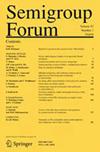算术全等单体的原子密度
IF 0.7
3区 数学
Q2 MATHEMATICS
引用次数: 0
摘要
考虑集合\(M_{a,b} = \{n \in \mathbb {Z}_{ge 1}: n \equiv a \bmod b\} \cup \{1\}\) for \(a, b \in \mathbb {Z}_{ge 1}\).如果 \(a^2 \equiv a \bmod b\), 那么 \(M_{a,b}\) 在乘法下是封闭的,被称为算术全等单元(ACM)。如果一个非单元 \(n \in M_{a,b}\) 不能表示为非单元的乘积,那么它就是一个原子,而 \(M_{a,b}\) 的原子密度就是原子元素的极限比例。在本文中,我们用 a 和 b 来描述 \(M_{a,b}\)的原子密度。本文章由计算机程序翻译,如有差异,请以英文原文为准。
Atomic density of arithmetical congruence monoids
Consider the set \(M_{a,b} = \{n \in \mathbb {Z}_{\ge 1}: n \equiv a \bmod b\} \cup \{1\}\) for \(a, b \in \mathbb {Z}_{\ge 1}\). If \(a^2 \equiv a \bmod b\), then \(M_{a,b}\) is closed under multiplication and known as an arithmetic congruence monoid (ACM). A non-unit \(n \in M_{a,b}\) is an atom if it cannot be expressed as a product of non-units, and the atomic density of \(M_{a,b}\) is the limiting proportion of elements that are atoms. In this paper, we characterize the atomic density of \(M_{a,b}\) in terms of a and b.
求助全文
通过发布文献求助,成功后即可免费获取论文全文。
去求助
来源期刊

Semigroup Forum
数学-数学
CiteScore
1.50
自引率
14.30%
发文量
79
审稿时长
12 months
期刊介绍:
Semigroup Forum is a platform for speedy and efficient transmission of information on current research in semigroup theory.
Scope: Algebraic semigroups, topological semigroups, partially ordered semigroups, semigroups of measures and harmonic analysis on semigroups, numerical semigroups, transformation semigroups, semigroups of operators, and applications of semigroup theory to other disciplines such as ring theory, category theory, automata, logic, etc.
Languages: English (preferred), French, German, Russian.
Survey Articles: Expository, such as a symposium lecture. Of any length. May include original work, but should present the nonspecialist with a reasonably elementary and self-contained account of the fundamental parts of the subject.
Research Articles: Will be subject to the usual refereeing procedure.
Research Announcements: Description, limited to eight pages, of new results, mostly without proofs, of full length papers appearing elsewhere. The announcement must be accompanied by a copy of the unabridged version.
Short Notes: (Maximum 4 pages) Worthy of the readers'' attention, such as new proofs, significant generalizations of known facts, comments on unsolved problems, historical remarks, etc.
Research Problems: Unsolved research problems.
Announcements: Of conferences, seminars, and symposia on Semigroup Theory.
Abstracts and Bibliographical Items: Abstracts in English, limited to one page, of completed work are solicited.
Listings of books, papers, and lecture notes previously published elsewhere and, above all, of new papers for which preprints are available are solicited from all authors.
Abstracts for Reviewing Journals: Authors are invited to provide with their manuscript informally a one-page abstract of their contribution with key words and phrases and with subject matter classification. This material will be forwarded to Zentralblatt für Mathematik.
 求助内容:
求助内容: 应助结果提醒方式:
应助结果提醒方式:


